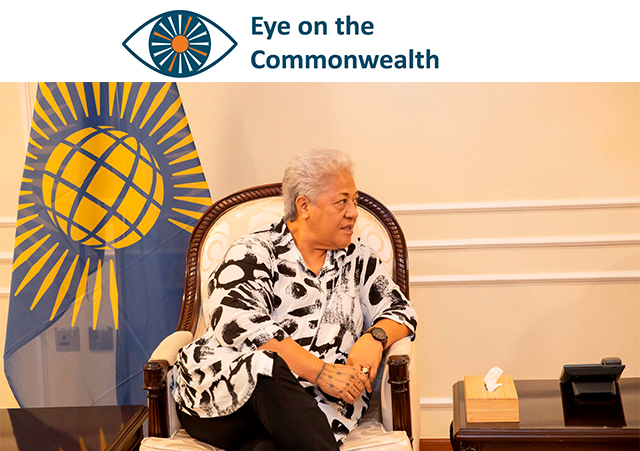 Prime Minister Fiamē Naomi Mata’afa said in Rwanda that the first CHOGM to be held in the Pacific islands provided an ‘opportunity to
refocus the Commonwealth on small states’. [photo: Commonwealth Secretariat on Flikr]
Prime Minister Fiamē Naomi Mata’afa said in Rwanda that the first CHOGM to be held in the Pacific islands provided an ‘opportunity to
refocus the Commonwealth on small states’. [photo: Commonwealth Secretariat on Flikr]
With the Pacific nation focused on the growing climate threat, the summit’s success will be measured by how much financing it unlocks
Samoa’s national rugby team, ranking an impressive 11th in the world, are ambassadors for the Pacific nation in more ways than one. Their exploits on the pitch have embellished the country’s reputation as fearsome competitors, including running Ireland, the top seeds, close in the World Cup. They might also be the only Samoans most people will ever see and, as such, the players are embodying what the prime minister set out as the country’s objective when it was named as the next host of the Commonwealth Heads of Government Meeting.
Speaking at the close of the last summit in Kigali, Fiamē Naomi Mata’afa said the first CHOGM to be held in the Pacific islands provided an ‘opportunity to refocus the Commonwealth on small states’. Appropriately for a country that is at high risk of cyclones, tsunamis, droughts and floods, the next CHOGM – which opens on 21 October 2024 – will centre on resilience. Speaking at the Commonwealth foreign affairs ministers’ meeting, which took place on the sidelines of the UN general assembly in New York last month, Mata’afa said the theme would be: ‘One Resilient Common Future: Transforming our Common Wealth.’
Referring to the Samoan way of life (fa’asamoa), and family in the widest sense (Aiga), Mata’afa said: ‘In the spirit of our Commonwealth Aiga and guided by the fa’asamoa, the government and people of Samoa eagerly anticipate welcoming the Commonwealth family to our island home, the Blue Pacific … as we come together to transform our one resilient family into a Common Wealth.’
Samoa’s CHOGM will ‘refocus Commonwealth on small states’, says Fiamē
Global finance and climate change – Countdown to COP28
Climate change – challenges, issues and Commonwealth responses
Resilience is needed in Samoa more than most places in the world. In March, the landmark report by the Intergovernmental Panel on Climate Change emphasised how small islands in the Caribbean and Pacific Ocean were ‘disproportionately affected relative to their small population’ yet caused only a quarter of the global average per capita emissions.
Referring to Pacific communities grappling with issues of sovereignty through loss of land and already being forced to relocate to different countries, Mata’afa told the Guardian then: ‘We’re all impacted, but the degree of the impact is in the particular circumstance of countries. So our low-lying atoll countries, it’s right there – we’re living with it.’ But she stressed: ‘This is a collective issue; no one is free from the impacts of climate change.’
Mata’afa told the UN last month that, amid record land and sea temperatures, droughts, flooding, cyclones and wildfires: ‘We will continually face these ever-worsening disasters if we continue to deny addressing their root causes.’ As well as demanding sharp reductions in global emissions and reliance on fossil fuels, Samoa’s prime minister is likely to be looking for serious progress towards an agreement on the loss and damage facility.
In line with the policy pursued by AOSIS, the Alliance of Small Island States, Samoa is likely to push hard on essentially three proposals: firstly, to create a system to help vulnerable countries identify risks and develop disaster-management and risk-reduction strategies; secondly, to set up an insurance scheme for damage from extreme weather disasters – pooling the risk for the many vulnerable small islands where the cost is otherwise prohibitive.
Commonwealth Global Challenges: Session four – After Kigali: The Commonwealth’s future challenges
Reflections from Kigali
Building more common wealth in a climate changed world
Thirdly, and most problematic for the richer countries in the Commonwealth and global north generally, is a demand for an international solidarity fund to compensate communities for damage caused by the more gradual side of the climate crisis, such as ocean acidification, rising sea levels and increasing salination of drinking water.
As the bill for this slow-mo side of the climate crisis, which could leave capitals underwater and require the complete relocation of coastal communities, is almost infinite, to expect much progress on this at next year’s CHOGM might be overly optimistic. Nevertheless, AOSIS is calling for developed countries to double adaptation finance by 2025 (the Cop26 summit in Glasgow said ‘at least’ double) and stump up the much promised – but not yet seen – $100bn a year in climate finance.
Preparations are well underway for next year’s event. Faleolo airport is getting an upgrade (it might seem to go against the calls to cut emissions but what choice does an isolated island nation in the Pacific have?) for the estimated 3,000 delegates and media personnel expected to fly in. This includes the construction of a new VIP lounge to cater to visitors such as King Charles III and better equipment (Air New Zealand recently halted flights to Samoa because of this issue).
However, it is far from clear how much progress has been made on the objectives agreed at last year’s CHOGM – or indeed the one before that, in London. The Commonwealth Secretariat was asked by this column to list some of the most spectacular successes but did not reply.
There were 55 mentions of ‘climate’ in the communiqué of the Kigali summit; is it too much to expect some sort of progress report on how much of last year’s wishlist has actually been achieved before we do it all again?
Oren Gruenbaum is a member of the Round Table editorial board.



